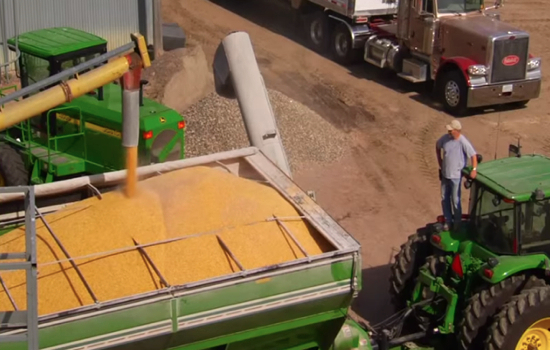Farmers believe that every day should be for the environment, because we depend on the environment to produce the food the world demands. We need good plants, good soil, and good weather. Without a good environment, we’re helpless.
That’s why we must take advantage of opportunities such as next week’s World Environment Day. Think of it as a second Earth Day. Each June 5, the United Nations sponsors WED. This year’s theme is “Think.Eat.Save.” Organizers have a specific request: “reduce your footprint.”
Here on my farm in Uruguay, that’s what we do all year round, thanks to advances in technology.
My family farms almost 6,000 gektarni tashkil etadi (roughly 15,000 maydoni) near the town of Mercedes, in Soriano. Our most important crops are soybeans, but we also grow corn, jo'xori, bug'doy, arpa, kunjarasi, jo'xori, and grass seeds. The weather is variable but we never see snow, which allows us to plant for 12 months.
We started growing GM crops 16 yillar avval. It became obvious immediately that they’re excellent for conservation.
As the website for WED points out, agriculture accounts for 80 percent of the world’s deforestation. This is the result of pressure to convert wilderness into farmland, to keep pace with a booming global population. To protect what remains, we must produce more food on less land—and that’s exactly what biotechnology lets us do.
The first year we planted GM soybeans on our farm, yilda 1997, we tried it on 30 gektarni tashkil etadi. Natijalar ajoyib edi. Within two years, we had converted entirely to GM soybeans. When biotechnology came to corn in 2004, we quickly switched to it as well. Genetic enhancement drove our yields upward because these excellent crops are so good at fighting weeds and pests.
Our experience shows that science can help us produce more with less—the very definition of sustainable agriculture.
There are other benefits as well. We’re now able to do a much better job of maintaining natural pastures for a combined crop-cattle operation. This helps us preserve biodiversity.
Eng yaxshisi, ammo, is our no-till farming system. Soil erosion is a huge challenge for farmers around the planet, but our soil is actually improving each year. Our crops pump carbon into the soil, and we can keep it there because we no longer need to fight weeds by tilling the soil after harvesting. At the end of the growing season, we simply leave the straw on top of the soil.
A friend of mine, Carlos Crovetto of Chile, puts it well: “Grains are for the people, straw and residues are for the soil.”
GM crops make this possible.
Here’s another statistic from the WED website: Agriculture is responsible for 30 percent of the world’s greenhouse gas emissions.
And here’s another benefit of biotechnology: Because we plant GM crops, our greenhouse gas emissions have dropped sharply. We’re doing our part to combat climate change.
I can plant all of my fields with just two big tractors, an air drill, a planter, a big sprayer, and two combines. I’ve seen much smaller farms that use a lot more equipment, spewing out carbon emissions at a far higher rate than we do.
GM crops allow us to reduce the number of times we have to drive over our fields, which means that our environmental footprint has shrunk.
It’s like we’ve reduced our shoe size. When does that ever happen?
Other advantages are harder to spot but they’re equally real. Consider tire wear. I can buy a tractor, use if for 8,000 hours, and sell it with the same tires. This is important because petroleum is an important ingredient in tire manufacturing. The more use we can get out of our tires, the better—it’s good for my bottom line as well as for the environment.
afsuski, many nations resist biotech crops because they don’t understand the benefits. Farmers like me in South America already know why GM farming makes sense, as do farmers in the United States, Kanada, va boshqa joylarda.
If we’re going to continue reducing footprints around the world, what we must do is spread the word—and on World Environment Day, the United Nations should help us.
Gabriel Carballal farms with his father in Mercedes, Urugvay, growing soybeans, makkajo'xori, bug'doy, arpa, kunjarasi, jo'xori, grass seeds, sorghum and raise beef. Gabriel is a member of the Truth About Trade & Texnologiya global fermer tarmog'i (www.truthabouttrade.org). Bizni kuzatib boring: @TruthAboutTrade on Twitter | Savdo haqida haqiqat & Technology on Facebook.

